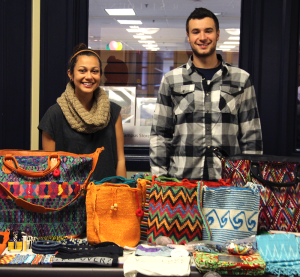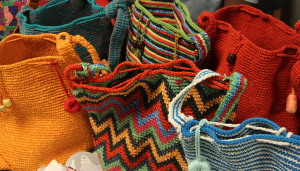
Khadija Khan (COL ’17) and founder Jacob Maxmin (COL ’17) tabling for Wearable Justice.
As a freshman, Jacob Maxmin’s (COL ’17) goal was to fill a void that he noticed in the Georgetown culture. Maxmin, now a sophomore, is the founder and CEO of Wearable Justice, a non-profit organization that is seeing great success in its second semester on campus. Wearable Justice is a student-owned, student-run ethical fashion distribution company that gives students access to ethical fashion at an affordable price.
Maxmin’s inspiration stemmed from his work as a campus representative for Bureh Belts and Lallitara apparel, both of which are now two of the eight ethical fashion companies that partner with Wearable Justice.
Maxmin originally found convincing students to adopt ethical fashion choices surprisingly difficult.
“It was a real challenge for me to market third-party ethical fashion companies and brands on campus,” Maxim said. “I was using social media to get people interested on campus but it wasn’t really working out. My solution to that problem was creating something where you could group a lot of ethical fashion companies in one company, student-run, student-owned, nonprofit with a lot of social impact and have an effect on campus.”
When asked, “Why ethical fashion?” Maxmin made a very accurate analogy. He explained that Georgetown students have access to Safeway and Whole Foods when they need to go grocery shopping. Whole Foods, the organic and more “ethical” option, is also the more expensive option. However, the option is still there. When going shopping for clothes, on the other hand, Georgetown students have H&M, J Crew and the rest of the well-known corporate stores lining the streets just outside of campus. But where is the ethical fashion option? This is where Wearable Justice comes in, and at an affordable price too.
The Wearable Justice team works with an ethical screen printing company in Wisconsin and buys products wholesale from ethical fashion companies, redistributing them on campus for discount prices. The team is responsible for the custom clothing many of us see around campus such as those of Students of Georgetown, Inc.
Wearable Justice is unlike other clothing companies in that it gives customers the easily accessible option to have a say in where and how our clothes are made, all at an affordable price. Having the option to choose ethical fashion is very appealing, especially for Georgetown students striving to promote social justice. Wearable Justice partners with companies that create products from responsibly sourced materials and with minimal environmental impact.
Workers for these companies receive fair wages and sustainable careers, unlike many other well-known fashion companies. To create even more of a social impact, these companies donate profits to charity and work to “enhance the lives of their workers,” according to their website. Thus, not only can you feel good wearing their clothes, but you can also feel good about where these clothes came from and how they were made.

The ultimate goal of the venture is to implement ethical fashion into Georgetown culture, but also work toward a long-term goal of using the profit to donate to a Washington, D.C. charity at the end of every school year. Yet another long-term and ambitious goal is for Wearable Justice to not only be a success and make a social impact here at Georgetown, but also to spread the social impact throughout the District.
“This is something we’re hoping to bring to other D.C. based schools,” Maxmin said
While this may be an ambitious goal, Wearable Justice has already exceeded the team’s expectations of success in its second semester on campus and is certainly on the road to making an even greater impression.
“We’ve been really successful. Our first month operating on campus,our sales were much better than we had originally forecasted for our opening month,” Maxmin said. “Monetarily and fiscally we have been doing really good, which has been really exciting. So we’re placing really big orders, winter scarves and stuff like that.”
Vice Presdient of marketing, Natalia Peña (COL ’17), sees the organization’s support only increasing in the future.
“When speaking to individuals who stop by our table to browse products, I find that they are very interested by our cause.,” Peña said. ‘What I want to achieve is this interest on social media platforms as well, to help expand our brand and our message that ethical fashion does indeed matter to the everyday Georgetown student.”
The company is also looking to host a lecture series on conscious consumers in ethical fashion, for which they already have Georgetown professor Sarah Stiles from the department of sociology as well as various other CEOs committed to speak.
In order to maximize its accessibility and outreach, Wearable Justice delivers anywhere for Georgetown students or faculty members. Customers can customize clothes or purchase items found on the website. The team is consistently looking to increase volume of clothing, so there are currently new arrivals pouring in for winter, on top of the already available scarves, tops, backpacks, purses and belts, among others.
Wearable Justice is looking for new members to get involved. They table at the Farmer’s Market in Red Square every Wednesday or in Red Square on Fridays. Starting in early November, Wearable Justice team members can be found Tuesdays through Fridays in the Healey Family Student Center.
Maxmin credits the extensive student support for the non-profit’s ongoing success.
“I am so impressed and I think my whole team is with how responsive and supportive the Georgetown community has been with what we’re trying to do,” Maxmin said.
The nonprofit ethical fashion distribution company is on its way to much success and will certainly make an impressive difference on the Georgetown campus and beyond.


















